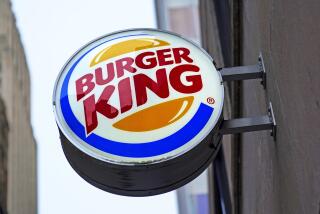4 Former Managers at Ahold’s U.S. Unit Face Fraud Charges
- Share via
U.S. prosecutors Tuesday unveiled securities fraud charges against four former executives of U.S. Foodservice Inc., accusing them of orchestrating an accounting scandal that battered the food distributor and its Dutch parent company, Royal Ahold.
In the first U.S. criminal charges resulting from the scandal, federal prosecutors accused the onetime managers of conspiring to inflate the company’s earnings by about $800 million over a two-year period.
At the heart of the case are charges that the former executives -- marketing manager Mark Kaiser, finance chief Michael Resnick and purchasing executives Timothy Lee and William Carter -- invented cost savings by recording fictitious rebates known as “promotional allowances.”
Kaiser and Resnick each face as many as 20 years in prison if convicted of securities fraud. They also face charges of filing false documents with the Securities and Exchange Commission.
Lee and Carter have pleaded guilty to securities fraud and conspiracy and agreed to cooperate with investigators. The SEC announced civil charges Tuesday against all four executives.
Ahold, the world’s third-largest food retailer and food services group after Bentonville, Ark.-based Wal-Mart Stores Inc. and Paris-based Carrefour, is only beginning to recover from the 2003 accounting scandal at the center of the charges.
The scandal has prompted investigators to scrutinize promotional allowances, which are a widely used but complex set of contracts that offer retailers discounts, money for advertising or payments for prominent shelf space.
These deals are hard to account for since they do not neatly fall into the category of revenue or a reduction in costs. They can be treated as a reduction in the cost of goods sold or booked as revenue or adjustments to other expenses.
The allowances have been blamed for helping some companies, including distributor Fleming Cos., which filed for bankruptcy protection last year, inflate profits.
In the case of U.S. Foodservice, the executives are accused of booking promotional allowances that never existed to give the appearance of savings, which in turn boosted profit.
U.S. Atty. David Kelley in New York described the case as “a cooking of the books fueled by the greed of the defendants” and said investigators were continuing to look at the company.
U.S. Foodservice had more than 125 promotional allowance contracts with vendors. The indictment alleges that in some cases the vendors provided false documents about the allowances to outside auditors of U.S. Foodservice.
Kelley declined to say whether charges would be brought against any of the vendors. “Obviously some large corporations were among those vendors,” he said.
Lawrence Benjamin, who took over as chief executive of U.S. Foodservice last year, said in a statement that the company had been working with investigators.
“We will continue to cooperate with the government in its efforts to hold accountable those individuals who may have violated the law and abused our trust,” he said.
More to Read
Inside the business of entertainment
The Wide Shot brings you news, analysis and insights on everything from streaming wars to production — and what it all means for the future.
You may occasionally receive promotional content from the Los Angeles Times.










